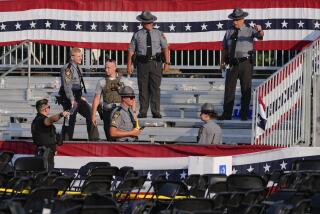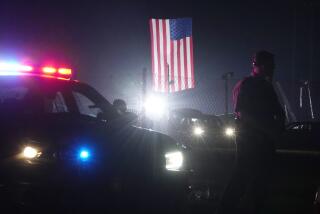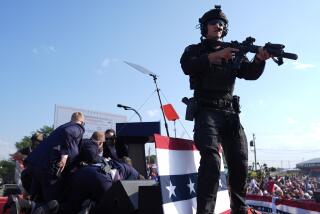Suspect in Charleston church attack detained; victims include 3 ministers
- Share via
reporting from Charleston, S.C. — Dylann Storm Roof, a white man who reportedly shouted racial epithets before opening fire inside an iconic black church in Charleston, S.C., and once displayed apartheid-era patches on his jacket, was being held Thursday in connection with the attack that left nine people dead and the nation again confronting race and violence.
After an intense overnight manhunt, Roof, 21, surrendered without incident in Shelby, N.C., about 250 miles from the historic Emanuel African Methodist Episcopal Church, home to a major African American congregation that traces its roots to the slave-holding days before the Civil War.
The gunman attended the church’s Bible meeting for nearly an hour before the attack began about 9 p.m. Wednesday.
“He stood up and was shouting and saying, ‘I have to do this,’ ” according to a law enforcement official briefed on the shooting, who spoke anonymously because the investigation is continuing. Witnesses have told some investigators that the gunman made racial comments before opening fire. The shooting is being investigated as a hate crime, authorities said.
Daniel E. Martin Sr., a retired circuit court judge and a member of the church, said his wife had gone to a meeting there Wednesday night and stayed for part of the prayer meeting attended by the shooter, but left before the shooting.
Other members of the church told him that the attacker shouted that he was there to kill some black people, Martin said Thursday outside a prayer vigil at Morris Brown AME. “He shouted other racial comments,” Martin said.
“He was shouting racial epithets,” said Paul Stoney, another member of Emanuel.
A witness in the church who was unharmed — one of three survivors in the church — told authorities that the gunman let her live so she could tell her story, said Charleston Police Chief Greg Mullen.
RELATED: Charleston church shooting victims: Who they were
“We don’t have any reason to believe there was anybody else involved,” Mullen said.
The gun he used was a recent “birthday gift” from his father when he turned 21 and was recovered in his car, a law enforcement official said. The make of the gun has not been released.
Dot Scott, president of the Charleston NAACP, said afterward that “the shooter made clear it was about race. This is the state of South Carolina.” She said the string of shootings of African American men by police around the country had become the “fertilizer for this mind-set” that led to the killing.
Local and national officials condemned the attack, which shattered this Southern city.
“That awful person, that terrible human being who would go into a place of worship where people were praying and kill them is now in custody, where he will always remain,” Charleston Mayor Joseph P. Riley Jr. told reporters. “In America, we don’t let bad people get away with these dastardly deeds.”
Mullen said Roof was arrested during a traffic stop after a citizen’s tip about a suspicious vehicle. He waived extradition and was returned to South Carolina Thursday evening.
“I cannot say how thankful I am and how appreciative I am of all the people who came together during a very tragic situation, a horrific situation, and one that has touched the heart and soul of every person who lives in this community,” Mullen said.
The law enforcement official who was briefed on the shooting said the gunman sat close to the prayer service leader, the pastor of the church and a state senator, Clementa C. Pinckney, for much of the evening. Pinckney was the first to be shot.
The official said the assailant methodically kept firing and reloading.
Charleston County Coroner Rae H. Wooten told reporters that all nine died from gunshot wounds, eight at the church and the other on the operating table at a hospital. The six women and three men range from 25 to 87 years old and include at least three ministers, she said.
Autopsies will be performed and the bodies will then be released to the families. Wooten said. “There is shock and grief over these losses,” she said of the relatives.
The dead were identified as Cynthia Hurd, 54; Susie Jackson, 87; Ethel Lance, 70; DePayne Middleton-Doctor, 49; Tywanza Sanders, 26; Daniel Simmons Sr., 74; Sharonda Singleton, 45; Myra Thompson, 59; and Pinckney, 41.
The shooting has resonated across the country, in a year when race relations have surged to the forefront after a string of violent episodes involving police and black citizens.
President Obama said he was saddened and angry about the shooting and repeated a call for dealing with the nation’s gun violence.
“Any death of this sort is a tragedy,” Obama said. “Any shooting involving multiple victims is a tragedy. There is something particularly heartbreaking about the death happening in a place in which we seek solace and we seek peace, in a place of worship.”
Obama called on the nation to act against gun violence.
“I’ve had to make statements like this too many times,” said the president. “At some point we as a country will have to reckon with the fact that this type of mass violence does not happen in other developed countries.”
Federal and state prosecutors on Thursday afternoon were discussing whether to file charges against Roof as a federal hate crime or as a case of nine homicides, or both.
“We will now be looking at all of the facts, all of the motivations that led this individual, if in fact he is the shooter,” to carry out the killings, said U.S. Atty. Gen. Loretta Lynch. “It is really premature to determine which is the best venue, either state or federal, to pursue this matter.”
In either instance, Roof could be sentenced to death if convicted.
A few blocks from the shooting scene, hundreds of Charleston residents, black and white, came together at Morris Brown, a sister church, for a prayer vigil for the victims, many of whom were painfully familiar to those attending.
“Charleston is small enough to make most of us connected by the hips,” said City Councilman Keith Waring after the 90-minute service. “We are all interconnected. That’s why it hurts.”
Every pew and every seat in the balcony and every place to stand in the back were filled. Hundreds more listened to street preachers in the hot sun outside. The vigil was packed with residents, local and state officials, congressional members and ministers from across “the holy city,” as Charleston is often called because of the number of churches in town.
Marvin Stewart, a librarian, said he was grieving for one victim who was a co-worker at a public library, whom he identified as Cynthia Graham Hurd, the sister of a state senator.
“I just saw her yesterday,” he said in wonder. “I have known her for 25 years. She helped decorate my house.” All public library branches were closed Thursday in mourning, he said.
“This is just pure evil at work. It is beyond race,” Stewart said.
A succession of ministers and other religious figures spoke words of comfort to the crowd in the sweltering heat.
Steve Simon, 69, a Unitarian Universalist minister from Charleston, noted that the crowd had people of many ages, religions and races.
The turnout was “an outpouring of love and concern and healing for an unforgivable act that has to be forgiven,” he said.
Mayor Riley pledged to reach out to the Emanuel AME Church, a majority-black congregation with a long and distinguished history that is rooted in the antebellum era.
“We will put our arms around that church and that church family,” Riley said.
A federal law enforcement official, who was not authorized to speak publicly, earlier told The Times that it appeared from surveillance images that the assailant may have been wearing a wig and a fake nose, and may even have dyed part of his skin.
The official also noted that the man was wearing a heavy sweat shirt on an extremely warm day in Charleston, and may have been dressed like that to hide a firearm. The shooter also appeared to be carrying a small backpack over his right shoulder which could have contained a weapon and ammunition.
The federal law enforcement official also said they were investigating a bomb threat that was called into police to blow up the church with a countdown of 86 minutes, the official said.
However, the source said, it was not immediately known whether the threat was authentic. No explosives had been found. “We’re not sure it’s connected,” the official said.
The church holds a Bible study class every Wednesday evening.
The gunman was in the church about 8 p.m. and apparently sat down, Mullen told reporters, based on information from a witness who was there and was unharmed. The witness, one of three survivors in the church, told authorities that the gunman let her live so she could tell her story. He opened fire about 9 p.m., Mullen said.
Emmanuel AME church traces its roots to 1816, when several churches split from Charleston’s Methodist Episcopal church. One of its founders, Denmark Vesey, tried to organize a slave revolt in 1822. He was caught, and white landowners had his church burned in revenge.
Parishioners worshiped underground until after the Civil War.
“Of all cities, in Charleston, to have a horrible hateful person go into the church and kill people there to pray and worship with each other is something that is beyond any comprehension and is not explained,” Riley said.
Richard Cohen, president of the Southern Poverty Law Center in Alabama, which tracks racial hate crimes said the attack by a white man on an important and long standing black church was “an obvious hate crime by someone who feels threatened by our country’s changing demographics and the increasing prominence of African Americans in public life.”
Roof’s Facebook page shows him wearing a dark jacket with the emblems of two flags from African countries when they were ruled by whites. One is from apartheid-era South Africa and the other is from white-dominated Rhodesia, now Zimbabwe.
“It’s incredibly creepy,” Cohen said in a telephone interview. “He walks into a black church and then stands up and opens fire. Maybe he waited first to get his courage up, or he was having second thoughts.”
But Cohen said it was “classic white supremacy” behavior to pretend to be part of a group you want to target.
Cohen added that there are 16 white supremacy and hate organizations in South Carolina. But he noted that many more young people like Roof often choose not to join the groups but rather scour the Internet and are radicalized in that way, much like foreign terrorists.
The attack came two months after the fatal shooting of Walter Scott, an unarmed black man, by a white police officer in neighboring North Charleston, which sparked protests and highlighted racial tensions in the area. The officer has been charged with murder, and the shooting prompted South Carolina lawmakers to push through a bill helping all police agencies in the state get body cameras.
Pinckney, 41, the senator and slain pastor, was a sponsor of that bill.
Serrano reported from Washington, Phelps from South Carolina and Muskal from Los Angeles.
More to Read
Sign up for Essential California
The most important California stories and recommendations in your inbox every morning.
You may occasionally receive promotional content from the Los Angeles Times.













